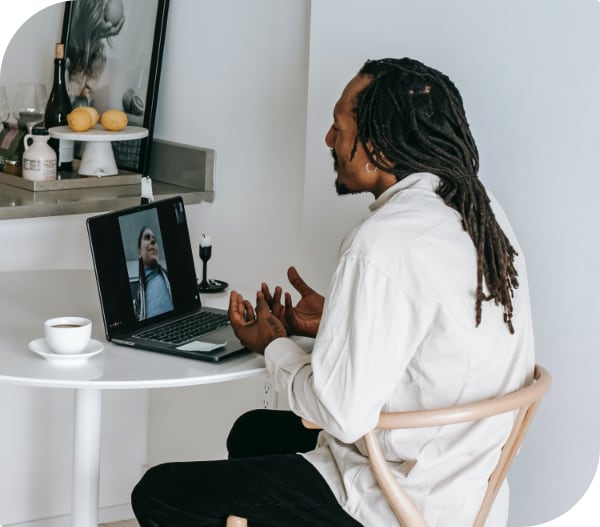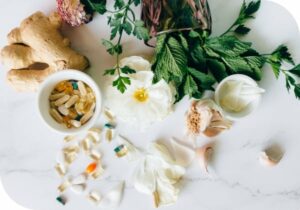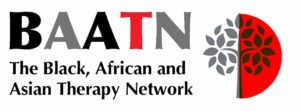Breaking Barriers:
Thriving As a Working Parent With Long-Term, Chronic Illness
Meet Catriona and Esther, friends who came together over illness. Here they share their story and day-to-day tips with us.
Catriona and I met in 2018, whist we worked for a paediatric rehabilitation centre in SW London as a Clinical Psychologist (Esther) and Occupational Therapist. I was in awe of Cat and saw her as a highly-skilled, compassionate OT, and Mum of three children aged 4 and 8, including twins!
 “How did she thrive and manage to juggle everything?” I thought?
“How did she thrive and manage to juggle everything?” I thought?
Catriona’s mother died suddenly in late 2017. Soon after, my family and I (Catriona) moved back to the UK from South Africa. I was still in the depths of grief and felt like no one really understood. In our first team meeting, I could see that Esther was different – her calmness, compassion, and authenticity shone through. She genuinely cared and showed great empathy towards me during this difficult time.
Esther’s Illness:
A few months after I met Catriona, I was hospitalised many times for a range of abdominal symptoms and pain all over my body. My kidney function was dropping, and – to my horror – a biopsy revealed a rare condition affecting the kidney filters. At first, I was unable to work and thought my much loved career as a Clinical Psychologist was over.
With two small children to look after, I could barely move or go out. A Professor of Nephrology told me in the lockdown of Summer 2020, after having my third baby, that I would be placed on a kidney waiting list, which was very traumatic. I thought I would be heading for dialysis.
I had been pushing myself to do NHS and private work alongside co-editing a book with over twenty contributors (Jim & Cole, 2019). This four-year project started when my firstborn (son) was a toddler in 2015. By the book launch in 2019, at The Royal Society of Medicine, having been in bed the whole day, I did not know I was expecting our third child and feeling a tiny bit better each week!
Catriona’s Illness:
I was diagnosed with Psoriasis at a young age and hospitalised many times during my childhood. It is an autoimmune skin disease. It also effects my joints and can make me feel very fatigued. Over the years, I have learnt to manage it, but it has not been easy dealing with the physical and psychological impact.
After my mother’s death, I was also diagnosed with a hole in my heart. This came as a big shock as I thought I would not be around to see my children grow up. However, just like Psoriasis, I see it as another condition to manage and keep monitoring. As I get older, I am more conscious that I need to make the most of my time.
So how do you deal with earth-shattering health news as a working parent? Over the years, Catriona and I have drawn from a few theories and research linking back to our work as therapists, to maintain our physical and mental well-being. We have lived it and, although no days are easy for us, we successfully juggle health, work and being a parent; and somehow wake up to three amazing children, who are thriving and growing each day. Here are 12 tips that we hope you find useful.
12 tips
On physical and mental health well-being
1. Embrace Flexible Working
 Being self-employed has enabled us both to choose our hours, for which we are extremely grateful. Whether you are employed, or self-employed, it is important to negotiate hours that work for you, your family, health and well-being. People may believe that more time spent at work equates to greater productivity. If people are burnt out and come into work for long hours, it is unlikely they will be as productive: employers merely get “presenteeism” from their teams.
Being self-employed has enabled us both to choose our hours, for which we are extremely grateful. Whether you are employed, or self-employed, it is important to negotiate hours that work for you, your family, health and well-being. People may believe that more time spent at work equates to greater productivity. If people are burnt out and come into work for long hours, it is unlikely they will be as productive: employers merely get “presenteeism” from their teams.
Working from home, avoiding lengthy commutes and working compressed hours – or extended hours over fewer days – might dovetail better with any childcare arrangements or hospital appointments. Time your annual leave for when it will be most beneficial and provide rest and restoration.
Ask your employer if you can use sick leave or other types of leave, such as time off in lieu (TOIL) for hospital appointments. Do not feel guilty take all the accrued annual leave you have after being off sick, on maternity or paternity leave.
2. Learn to say “No”: Defer – Delegate – Delete
Defer – Delegate – Delete: these are three methods to use at work to carve out time boundaries to avoid overwhelm. There are the same number of hours in a day, and more things to do now we are parents and have our health to manage, so it is unrealistic to expect yourself to do everything as the tasks mount up.
Avoid people-pleasing or feeling apologetic about your circumstances, and set boundaries with care and compassion for yourself (and others). You are worth it, and you are good enough. We appreciate this is easier said than done at Ames when job roles do not feel secure, but it is unlikely we’ll be able to manage if we set unrealistic goals.
3. Resources and Support
 As your household, work, and childcare demands increase, ask for help from friends, family or colleagues or, if you have a budget, pay for the help. Expecting you will do it all every day, on top of your paid work – cleaner, cook, nurse, taxi, teacher, laundrette, etc. is not realistic and is not a sign of weakness.
As your household, work, and childcare demands increase, ask for help from friends, family or colleagues or, if you have a budget, pay for the help. Expecting you will do it all every day, on top of your paid work – cleaner, cook, nurse, taxi, teacher, laundrette, etc. is not realistic and is not a sign of weakness.
4. Try Herbal and Natural Remedies

One of the best decisions I (Esther) made, was to consult with a Functional Medicine Practitioner. She revolutionised my diet and gave me herbal treatments to remedy my symptoms naturally. We take our vitamins!
The default is to go to our GPs. However, traditional medicine (as brilliant as it is) is about fighting disease in a compartmentalised way – organ by organ — and less about replenishing your whole body in a holistic way.
To our dismay, the NHS is also a post code lottery — after almost 3 years, a locum GP in a different borough discovered I (Esther) had an underactive thyroid. Treatment of this, within a matter of weeks, meant I could work again!
5. Check Your widow of Tolerance
Polyvagal theory was first coined by Porges and his experiments with the vagus nerve. It relates to the two branches of the nervous system — the sympathetic and the parasympathetic. These branches are responsible for regulating social behaviour, emotions, and physiological states. This is the body’s way of telling us that we safe or can make connections (parasympathetic nervous system) or if we need to enter into a ‘fight or flight’ state (sympathetic nervous system) because we are scared or angry. At other times, our bodies may withdraw into a dissociative state where we are numb and depressed. Therefore, it is important to ‘listen’ to our bodies when they send us these signals to warn us.
6. Beware of Burnout
Read the early warning signs of burnout. Stress impacts the immune system, and then your body can be exposed to any number of infections. Our bodies also remember trauma, tension and pain, which can create extra layers of vulnerability in the context of a full or overwhelming workload.
7. Take 7 different types of rest
Catriona and I initially only knew about physical rest when we became unwell. We did not know there were 7 types:-

• Creative
• Social
• Emotional
• Mental
• Sensory
• Spiritual
Be sure to read up on them and get a variety of rest in your schedule. I (Catriona) find that when I am drawing or painting, singing with the choir I joined recently, or attend church, I can feel rested and restored. Calming or alerting inputs help to feed our sensory systems. With alerting inputs, I feel more invigorated despite feeling tired to start off with.
When we feel stressed or exhausted, we need calm, i.e. taking a bath or listening to soothing music. If we feel the need to regain focus or feel a little sleepy, then we may need more alerting stimuli like a gym session, a walk outdoors or a fitness class. We all have sensory thresholds and profiles which can help us determine what type of person we are and what we are better suited to in terms of activities across the day, and over different settings.
8. Carve Out Time
It is natural to dedicate most waking hours to work, the children and hospital appointments. If we do not carve out even 1 hour of the day for activities, rest, or things we enjoy, it quickly mounts up, leading to burnout and exhaustion. Likewise, relationships can suffer if time is not carved out for them. They are like a plant that needs watering regularly. It is more difficult to be spontaneous as a couple when every waking minute is spoken for, so time together takes careful planning and regular watering
9. Step Back from Your Thinking
In Acceptance & Commitment Therapy (ACT), stepping back from our thinking is called the “defusion” technique. All out negative thoughts and thinking do not have to define us. Think about your thinking and realise thoughts are not facts — they are not always true. I believed I was heading for a transplant (Esther), but, in reality I had my third child (in lockdown!), and my kidney function has been stable ever since (touch wood!).
We do not know what is going to happen in the future. Doctors are doing their best with the available medical evidence they have, but a diagnosis does not always equal the same prognosis for everyone.
Furthermore, there can be many factors outside our control, or understanding, that impact our recovery. For example, there is emerging research showing the stem cells of an unborn child can migrate to the mother’s damaged tissue and repair it. Could this have happened to me (Esther)? I may never know, but what we do know is it is important to stay in the present moment and that research is mounting to prove this is linked to happines
10. Get “In The Zone”
 It is important to do activities that you enjoy, value and give your life meaning (Miralles & Garcia, 2017). For example, writing this for us gives us a feeling of turning our pain into purpose. For me, (Catriona) being “in the zone” or in a flow state, when I draw and paint, means that time stands still. I am truly present without being consumed by hundreds of thoughts.
It is important to do activities that you enjoy, value and give your life meaning (Miralles & Garcia, 2017). For example, writing this for us gives us a feeling of turning our pain into purpose. For me, (Catriona) being “in the zone” or in a flow state, when I draw and paint, means that time stands still. I am truly present without being consumed by hundreds of thoughts.
Having fun with my kids are some of my (Esther) best moments of flow! Studies have shown that experiencing flow can help guard against depression and burnout. A great way to remember this is that the Professor of Psychology who coined the term “flow state” is Mihaly Csikszentmihaly; and the phonetic guide to his name is: “Me high? Cheeks send me high!”
11. Choose Positive People
I (Esther) was unsure how I would earn a living when I was so sick. In the early days, I sent referrals to friends and colleagues. This is how Lifespan Psychology-The Diverse Practice® started – as a one-woman band – and is now a team of 16 or more psychologists and psychotherapists, and growing, with practitioners with heritages from around the world.
In my personal life, as hard as it may be – I try not to spend too much time with people who send off negative vibes — they are drains, so surround yourself with radiators! We always try to do what we can for others who may need support, but if you are made to feel bad at the same time you are helping the person — consider running for the hills
12. Plan for the Future
The worst-case scenario is always extremely frightening. In the early days, before you adjust to a diagnosis, you expect the worst outcomes. It is almost more grounding than the overwhelm of uncertainty and hope, to believe in the worst-case scenario. In all honesty, in the back of our minds, we are naturally scared of death or leaving our children and loved ones behind, but it is important that this is only one of a myriad of other possibilities we can conceive of for the immediate future. Embrace every precious moment you can with happiness and joy. ■
“Perfect happiness is a beautiful sunset,
the giggle of a (grand)child, the first snowfall. It’s the little things that make happy moments, not the grand events. Joy comes in sips, not gulps.“ Sharon Draper
Read the sister article: We Need to Talk About Organ Donation”: On Being of African Ancestry with Chronic Kidney Disease (CKD)
References
Jim, J. & Cole, E. (2019). Psychological Therapy for Paediatric Acquired Brain Injury. Innovations for Children, Young People and Families. London: Routledge.
Dawe, G., Tan, X. & Xiao, Z. (2007). Cell Migration from Baby to Mother. Cell Adh Migr, 1 (1) 19-27.
Miralles, F& Garcia, H. (2017). lkigai: The Japanese Secret to a Long and Happy Life. London: Penguin Book
Dr Esther Cole
Founder & Clinical Director Lifespan Psychology – The Diverse Practice
Catriona Harrison-Harvey
Specialist Paediatric
Occupational Therapist
Originally published in Parents in Biz Magazine – June 2023
